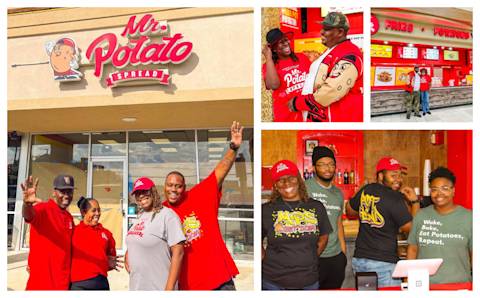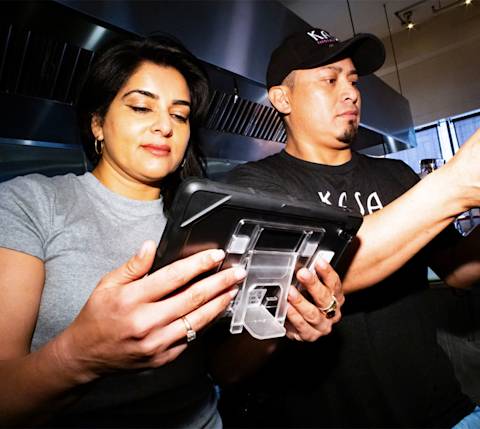It takes a special set of leadership skills to effectively and efficiently run a small business — especially if that business is a restaurant.
I would know — after spending over a decade as a small business efficiency expert for a Fortune 50 company, I decided to bring my extensive business knowledge to launching my own food business with my husband. Since 2014 I have been the president of Mr. Potato Spread, operating a food truck and multiple brick-and-mortar restaurants in Jacksonville, Florida, along with full-service and drop-off catering.
We're grateful to have experienced much success since we first launched a decade ago, and this year I was honored to be named the 2024 JAX Chamber of Commerce's 2024 Overall Small Business Leader of the Year, and a Jacksonville Business Journal 2024 Woman of Influence. But I owe that success to finding the right people to help me run my restaurants and dedicating the time and resources to ensure they can excel in their roles.
I'm especially passionate about supporting women in restaurant leadership, which is why I'm a Founding Board Member for The Empowered Kitchen. We provide training and mentorship opportunities to women in the food industry across Northeast Florida.
From January through June 2024, I was also nominated to the DoorDash Restaurant Advisory Council (RAC) to help shape the delivery-driven future of this industry. At a recent RAC meeting, I had the chance to share my experience in recruiting and cultivating restaurant leadership at Mr. Potato Spread. Here's a rundown of what we discussed.
Why leadership matters for your restaurant
The hospitality sector is known for its high turnover, with an average annual restaurant industry turnover rate estimated at 79.6% over the past decade. There are many factors that drive this turnover, from the pressure of working in a fast-paced and demanding environment to the increasing desire for autonomy and flexibility among employees.
But management can make or break the employee experience, and staff are just as likely to leave if leaders aren't communicating effectively or creating a positive workplace culture.
And it's not front-of-house and back-of-house staff who have high turnover rates. It can be difficult for restaurants to retain their leadership and management talent too, because these roles also face their fair share of challenges:
Customers can sometimes be less tolerant in the food industry — they have strong preferences about what and where they eat, and leaders need to be ready to handle concerns, complaints, and conflicts while always maintaining a high level of service.
Running restaurants is never simple. From food prep and service to supply chain management and marketing, an establishment's operational complexity can be overwhelming for anyone who isn't properly trained in every aspect of the business.
Employee expectations are changing, and many workers are exploring options outside of traditional hourly positions as they seek better pay, better working conditions, and more flexibility than the restaurant industry has typically provided.
As a business owner, how can you ensure you have leaders in your restaurant to deal with these challenges? Not only is restaurant leadership essential for keeping your employees engaged and satisfied, but it can also free you from dealing with day-to-day management so you can focus on setting goals and realizing new growth.

Promote the stars already on your team
You might be thinking that identifying and hiring skilled restaurant managers for your restaurant is a daunting prospect — but have you considered the talent you currently have? You may have an amazing potential manager on your team right now, hiding in plain sight. I know this from my own experience.
I needed a general manager at my main Mr. Potato Spread location so I could focus more of my time on long-term planning and building my future business strategy. But rather than hiring externally, I had a cashier who showed incredible initiative, empathy, intuition, and judgment. My staff trusted her and my guests loved her, so I asked if she would be interested in growing her skills into a general manager role. It was one of the best decisions I've ever made.
To reduce restaurant turnover, business owners need leadership teams that can communicate effectively and foster a cohesive workplace culture. Keep an eye out for employees who have exceptional interpersonal skills and the drive to excel, and consider training them for leadership positions.
The best coaches still benefit from coaching
Training and growing as a leader should always be an ongoing process. Continuous learning and coaching is a powerful tool for business owners and their leadership teams.
I'm fortunate to have a close friend who's a certified leadership coach, and I work with her periodically to stay focused on my business, my employees, and my objectives. But I also ensure my restaurant managers have ample opportunities to work with her as well. Promoting self-awareness and personal development can have profound impacts on leadership teams.

How to set up restaurant teams for success
Implementing restaurant leadership training is not the only path for encouraging success. There are other initiatives you can take as a restaurant owner to boost your company culture, encourage employee engagement, and empower a high-performing team. Here are eight suggestions to deliver results:
1. Use an effective assessment framework
Behavioral assessment and survey tools are a standard part of leadership training, but you can also share them with team members across your organization. DiSC® is one example, and another well-known option is The Fascinate System™️.
2. Formalize an innovative training program
Whether you're devising a training program for prospective managers or revising your onboarding materials for new employees, don't be afraid to get creative. For instance, we gamified our employee training at Mr. Potato Spread: Different skill sets are assigned titles, and when trainees master a skill and earn a title, they gain incremental bonuses.
3. Recognize and reward employees' efforts
While it's good to have a program in place to reward team members who exceed expectations, don't let that limit how you show gratitude. Spur-of-the-moment rewards, such as buying a coffee or giving a gift card, are examples of gestures that employees appreciate.
4. Conduct regular performance evaluations
Show your team you're invested in their growth by implementing performance reviews. Help them feel seen — but just as importantly, make sure they're heard. Evaluations should be a dialogue, not a monologue, and you should welcome constructive feedback. It's a learning opportunity for everyone.
5. Track every initiative
To know how successful any new strategies are, you need to monitor and measure them constantly. Document everything you're doing so that you can assess what's working; if something isn't, look at the data, listen to your team, and be willing to pivot.
6. Give employees a voice
Set aside time for team meetings on a recurring basis and welcome everyone, as this allows your employees to be more engaged. But since it's not always easy to get the whole team in the same room, even having casual conversations with trusted employees can also be constructive. The points your employees raise, and the gaps they notice, will surprise and enlighten you.
7. Promote workplace diversity and inclusion
You want to hire the best of the best — and you can't do that if your restaurant is in any way unwelcoming. That's why it's imperative to take diversity, inclusion, equity, and belonging seriously and demonstrate an ongoing commitment to those principles.
8. Empower teams
If you want to recognize stars on your team, you need to give them a chance to shine. Create opportunities for staff members to support you in growing the business. For example, encouraging employees to post about your restaurant on social media promotes your business with low-cost, authentic grassroots content marketing.
The ROI of strong restaurant leadership

Investing in a well-trained team, both at the leadership level and across the business, can truly make a difference. With a positive workplace culture and engaged employees, your restaurant can operate more efficiently, which can lead to a better reputation, a stronger brand, and more satisfied guests.
Put your people first. For restaurants, leadership training is an important strategy for reducing those notorious turnover rates and the costs of constant recruitment — and building a brand that people are excited to work for and represent.




